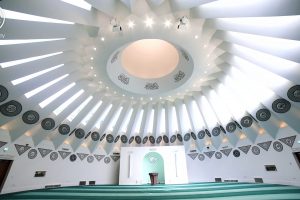
In the Mubarak Mosque in Islamabad, Tilford, His Holiness Hazrat Mirza Masroor Ahmad (aba) envisioned having the attributes of Allah on its walls so people could reflect deeper on God’s existence. His Holiness (aba) guided minutely on all aspects of design and implementation.
This series delves deeper into each of God’s attributes to gain a better understanding of His Being.
The calligraphy was designed by Razwan Baig, while The Review of Religions were given the opportunity to manage the project and produce each piece. Research for this series was compiled by Syed Mubashar Ayyaz (Research Cell) and translated into English by Shahzad Ahmed, Zafir Mahmood Malik and Nooruddeen Jahangeer Khan.

75. The Lord of Retribution (Al-Muntaqim)
يَوۡمَ نَبۡطِشُ ٱلۡبَطۡشَةَ ٱلۡكُبۡرَىٰٓ إِنَّا مُنتَقِمُونَ
‘On the day when We shall seize you with the great seizure, then certainly We will exact retribution.’ [1]
According to the Arabic lexicon, Al-Munjid, the attribute الـمُنْتَقِم (Al-Muntaqim) is derived from اِنْتَقَمَ (in-ta-qa-ma) which means, ‘he meted out punishment.’
It is narrated by Masruq that he was with Hazrat Abdullah (ra) bin Mas‘ud when he stated:
‘When the Holy Prophet (sa) saw the refusal of Islam by the people [of Quraish], he prayed, “O Allah! Afflict them with seven years of famine like the seven years that befell the people in the time of Prophet Joseph (as).” So they were stricken with famine for a year which destroyed everything to the extent that they had to resort to eating hides, carcasses and rotten dead animals. Whenever one of them looked towards the sky, he would [imagine himself] to see smoke owing to a state of extreme hunger. Subsequently, Abu Sufyan went before the Holy Prophet (sa) and said, “O Muhammad [sa], you order people to obey Allah and establish good relations with kith and kin. No doubt, your people are dying, so pray for them to be saved.”’
The narrator states further narrates:
‘God Almighty had revealed from before: “But watch thou for the day when the sky will bring forth a visible smoke… On the day when We shall seize you with the great seizure, then certainly We will exact retribution.”[44:11-17].
And this divine retribution was fulfilled in the Battle of Badr.’ [2]
God Almighty, the Most Supreme
Whilst explaining the attributes of Allah the Almighty, the Promised Messiah (as) states:
‘God Almighty is the Most Supreme. If thereafter one does not desist [from their evil ways], His wrath is kindled. Just as God Almighty is the Coverer [of weaknesses], so too is He the Lord of Retribution and possesses great honour.’ [3]
Endnotes
- The Holy Qur’an, 44:17.
- Sahih al-Bukhari, Kitab al-Istisqa, Hadith No. 1007.
- Hazrat Mirza Ghulam Ahmad (as), Malfuzat – Volume V (Pakistan: Nazarate-Isha’at, 1984), 182.

76. The Effacer of Sins (Al-‘Afuww)
إِن تُبۡدُواْ خَيۡرًا أَوۡ تُخۡفُوهُ أَوۡ تَعۡفُواْ عَن سُوٓءٖ فَإِنَّ ٱللَّهَ كَانَ عَفُوّٗا قَدِيرًا
‘Whether you make public a good deed or conceal it, or pardon an evil, Allah is certainly the Effacer of sins, and is All-Powerful.’ [1]
Hazrat Mirza Tahir Ahmad (rh), the Fourth Caliph of the Ahmadiyya Muslim Community has a given a detailed explanation of the attribute Al-‘Afuww. He states that عَفُوٌّ (‘afuww) is one who overlooks the shortcomings of others, whereas غَفُوْرٌ (ghafūr) means one who grants forgiveness. One of the meaning of ‘afuww is that despite seeing a sin being committed, one turns away as if one has not seen it. Hence, the root word عَفَا (‘afā) means to completely wipe something clean. Similarly, when afā is used in reference to land, it means a land which is uncultivated and uninhabited. The divine attribute Al-‘Afuww refers to that Being Who despite witnessing an evil, turns away from it and treats the individual as if no evil was committed at all. However, the attribute of Al-Ghafūr goes one stage beyond Al-‘Afuww and signifies that when an individual commits an evil deed to the extent that it warrants divine punishment – and subsequently the punishment is decreed – but if the one who committed the evil then turns to his Lord in a state of utmost fervency and seeks forgiveness, then the attribute of Al-Ghafūr comes into effect and saves the individual. [2]
Hazrat A‘ishah (ra) relates: ‘I said, “O Messenger (sa) of Allah, if I were to know when the Night of Decree is, then what should I recite?” The Holy Prophet (sa) said, ‘Say: “O Allah! You are the Great Pardoner, Benevolent. You love to pardon, so pardon me.”’ [3]
No Blame Shall Lie on You This Day
The attribute of Al-‘Afuww was also mentioned in one of the revelations of the Promised Messiah (as):
‘Our Lord, forgive us, we were in error; and they will fall down on their faces. (They will be told:) No blame shall lie on you this day. May Allah forgive you. He is the Most Merciful of all those who show mercy.’ [4]
Endnotes
- The Holy Qur’an, 4:150.
- Khutbat-e-Tahir, Vol. 3, pp. 15-16, Friday Sermon 13th January 1984
- Sunan al-Tirmidhi, Kitab al-Da’wat, Hadith No. 3513.
- Hazrat Mirza Ghulam Ahmad (as), Tadhkirah (Tilford, Surrey: Islam International Publications Ltd., 2018), 510.

77. The Just (Al-Muqsiṭ)
وَإِن طَآئِفَتَانِ مِنَ ٱلۡمُؤۡمِنِينَ ٱقۡتَتَلُواْ فَأَصۡلِحُواْ بَيۡنَهُمَاۖ فَإِنۢ بَغَتۡ إِحۡدَىٰهُمَا عَلَى ٱلۡأُخۡرَىٰ فَقَٰتِلُواْ ٱلَّتِي تَبۡغِي حَتَّىٰ تَفِيٓءَ إِلَىٰٓ أَمۡرِ ٱللَّهِۚ فَإِن فَآءَتۡ فَأَصۡلِحُواْ بَيۡنَهُمَا بِٱلۡعَدۡلِ وَأَقۡسِطُوٓاْۖ إِنَّ ٱللَّهَ يُحِبُّ ٱلۡمُقۡسِطِينَ
‘And if two parties of believers fight against each other, make peace between them; then if after that one of them transgresses against the other, fight the party that transgresses until it returns to the command of Allah. Then if it returns, make peace between them with equity, and act justly. Verily, Allah loves the just.’ [1]
According to the Arabic lexicon, Al-Munjid, الْمُقْسِط (Al-Muqsiṭ) is an attribute of God and means the One Who is Just and whenever He issues a decree, it is free of any element of injustice.
Hazrat Abu Musa (ra) narrated that the Holy Prophet (sa) once addresses and informed of five things. He stated,
‘Allah does not sleep as the act of sleep does not behove His exalted status. He possesses control over the scales of justice. The deeds committed in the night are presented before Him before the deeds committed in the day and similarly the deeds committed in the day are presented before Him before the deeds of the night. His veil is pure light, and if He were to remove it, the glory of His countenance would burn his creation as far as His gaze would reach.’ [2]
The Advent of the Promised Messiah and Mahdi
Explaining the significance of his advent and dispelling the myths surrounding the advent of the Promised Messiah and Mahdi, the Promised Messiah (as) explains:
‘Of course, I do not believe in the coming of an imaginary Messiah and Mahdi. But there is also an added reason, which is that I have publicly proclaimed that God has revealed to me that the real Promised Messiah who is also the Mahdi, tidings of whose appearance are to be found in the Bible and the Holy Quran and whose coming is also promised in the ahadith is none other than myself. However, I have come without a sword or a gun; God has commanded me that with meek and gentle humility and peace I should invite people to God Who is True, Eternal and Immutable and is the Most Holy, All-Knowing, Ever-Merciful, and Just.’ [3]
Endnotes
- The Holy Qur’an, 49:10.
- Sunan Ibn Majah, Kitab al-Muqaddimah, Hadith No. 195.
- Hazrat Mirza Ghulam Ahmad (as), Jesus in India (Tilford, Surrey: Islam International Publications Ltd., 2016), 12.

78. The Lord of Sovereignty (Mālik-ul-Mulk)
قُلِ ٱللَّهُمَّ مَٰلِكَ ٱلۡمُلۡكِ تُؤۡتِي ٱلۡمُلۡكَ مَن تَشَآءُ وَتَنزِعُ ٱلۡمُلۡكَ مِمَّن تَشَآءُ وَتُعِزُّ مَن تَشَآءُ وَتُذِلُّ مَن تَشَآءُۖ بِيَدِكَ ٱلۡخَيۡرُۖ إِنَّكَ عَلَىٰ كُلِّ شَيۡءٖ قَدِيرٞ
Say, ‘O Allah, Lord of sovereignty, Thou givest sovereignty to whomsoever Thou pleasest; and Thou takest away sovereignty from whomsoever Thou pleasest. Thou exaltest whomsoever Thou pleasest and Thou abasest whomsoever Thou pleasest. In Thy hand is all good. Thou surely hast power to do all things.
مَلَك (malak), مَلِك (malik) and مالِك (mālik) are three similar words. Mālik means the one who rightfully owns a thing or who wields rightful authority over it; malak means angel and malik means a king, i.e., the one who exercises political authority.
The word malik مالِك means the one who rightly possess something and exercises his authority over it. This can also be used for the one who issues commands and directives according to his will for other people to adhere to. Al-mulk الْمُلْك means to exercise one’s authority over something which they have complete ownership of.
According to the lexicon ‘Aqrab al-Mawarid, God Almighty is مَالِكُ الْمُلْك (Mālik-ul-Mulk) which means He is the King of all kings. In relation to this there is a tradition of the Holy Prophet (sa).
Abi Salamah narrates on the authority of Abu Hurairah (ra) who said that he heard the Holy Prophet (sa) say: ‘Allah will hold the entire earth, and roll up the heavens with His Right Hand, and will then say, “I am the King; where are the kings of the earth?”’ [2]
Man Cannot Fathom the Mysteries of God Almighty
Explaining God Almighty’s infinite powers and wisdom, the Promised Messiahas states,
‘All that I say is that you should acknowledge the greatness of the Glorious God, and should not be unjustly stubborn to reject His new works (which are only new in your limited sight), because, as I have already said, so far man has not fully comprehended the wonderful powers, subtle points of wisdom and ever complicated mysteries of God Almighty. Nor can one imagine that he would ever have the ability and power to measure the transcendent secrets of the Lord of Sovereignty out in future, like a small piece of land, or could ever dare claim that he has fully comprehended all the qualities of even one thing [created by God].’ [3]
Endnotes
- The Holy Qur’an, 3:27.
- Sahih al-Bukhari, Kitab al-Tafsir, Hadith No. 4812.
- Hazrat Mirza Ghulam Ahmad (as), Surma Chashma Arya, Ruhani Khaza‘in, Vol. 2 (Pakistan: Islam international Publications Ltd., 2009), 67-70.

79. The Compassionate (Ar-Ra‘ūf)
أَلَمۡ تَرَ أَنَّ ٱللَّهَ سَخَّرَ لَكُم مَّا فِي ٱلۡأَرۡضِ وَٱلۡفُلۡكَ تَجۡرِي فِي ٱلۡبَحۡرِ بِأَمۡرِهِۦ وَيُمۡسِكُ ٱلسَّمَآءَ أَن تَقَعَ عَلَى ٱلۡأَرۡضِ إِلَّا بِإِذۡنِهِۦٓۚ إِنَّ ٱللَّهَ بِٱلنَّاسِ لَرَءُوفٞ رَّحِيمٞ
‘Hast thou not seen that Allah has subjected to you whatever is in the earth, and the ships that sail through the sea by His command? And He withholds the rain from falling on the earth save by His leave. Surely, Allah is Compassionate and Merciful to men.’ [1]
According to ‘Aqrab al-Mawarid, الرَّؤُوْفُ (Ar-Ra‘ūf) is derived from the Arabic root رَأَفَ (ra-a-fa) which means that one showed mercy. Another explanation of الرَّؤُوْفُ is that it means اَشَدَّ الرَّحْمَة (ashadda al-rahmah) which signifies that one showed extreme mercy and compassion.
In one of the traditions it is mentioned that the Holy Prophet (sa) would advise that when one completes their Salat, they should recite the following prayer:
‘O Allah, You are the Most Holy and there is none worthy of worship except You. Forgive me my sins, reform my deeds, You grant forgiveness to whosoever You please for You are the Most Forgiving and Benevolent. O Allah, the Most Forgiving, grant me forgiveness. O Allah, the Oft Returning with Compassion, accept my repentance. O Allah, the Merciful, grant me Your mercy. O Allah, the Forgiver of Sins, grant me Your pardon. O Allah, the Compassionate, bestow upon me Your compassion and kindness. O my Lord, grant me Your bounties, so that I may express my gratitude for them and enable me to worship You in the most excellent manner. O my Lord, I seek all goodness from You and seek refuge with You from every ill. O my Lord, show me the paths that lead to goodness and grant me a good end; instil within me the desire to seek Your communion which is completely pure from all harm and evil that could lead one astray. Whomsoever is granted Your protection against evil comes under the shade of Your mercy and indeed this is a supreme triumph.’ [2]
God’s love for His Creation
Explaining the philosophy as to why some prayers are not answered by God Almighty, the Promised Messiah (as) states:
‘Hence, how can Allah the Exalted, Who is the Knower of the unseen, and in fact the Knower of all things, and Who is more gracious and kind than even a mother, and Who is the very Being who instilled this love into the hearts of mothers, bear to accept immediately the prayer of a dear servant of His who has, out of his human weakness, error and ignorance, asked for something that is harmful for him? Not at all. God rejects such requests and grants His servant something better in return.’ [3]
Endnotes
- The Holy Qur’an, 22:66.
- Al-Mu’jam al-Kabir, Al-Tabarani, Hadith No. 9942.
- Hazrat Mirza Ghulam Ahmad (as), Malfuzat – Volume II (Farnham, Surrey: Islam International Publications Ltd., 2019), 133.




Add Comment